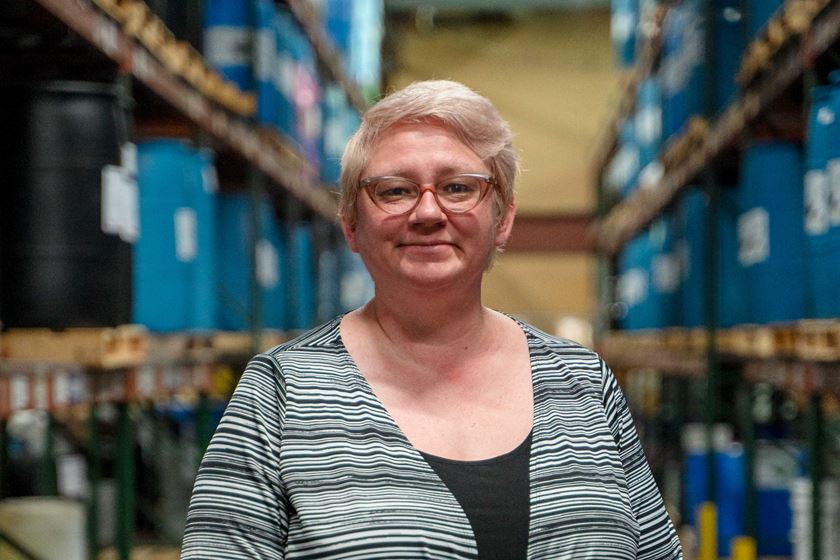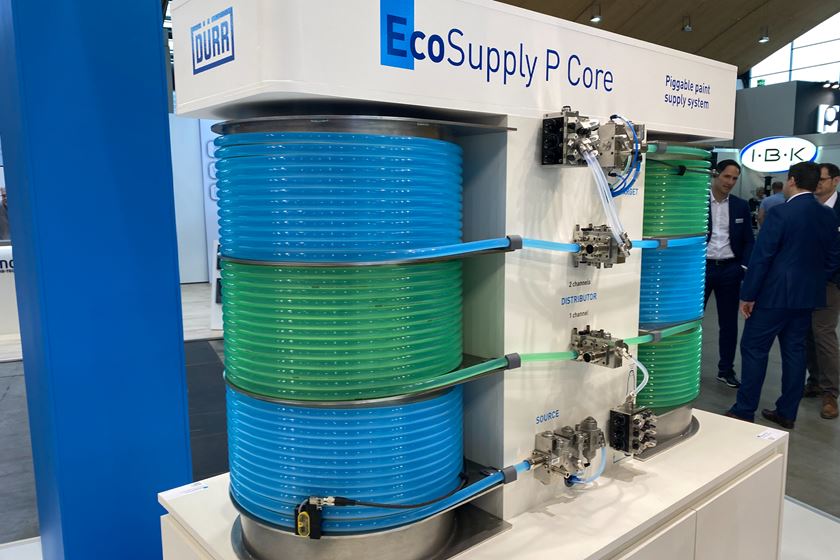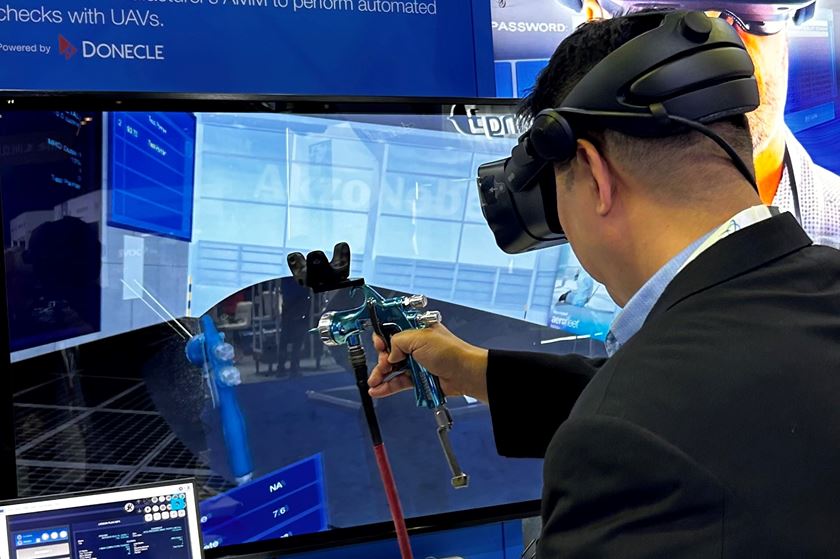A Conversation with Richard Lynch of MacDermid Enthone
Vice president of MacDermid Enthone Richard Lynch talks to Products Finishing about the importance of mentors, sustainability and sweater vests.
#sustainability
Edited by Jenny Rush
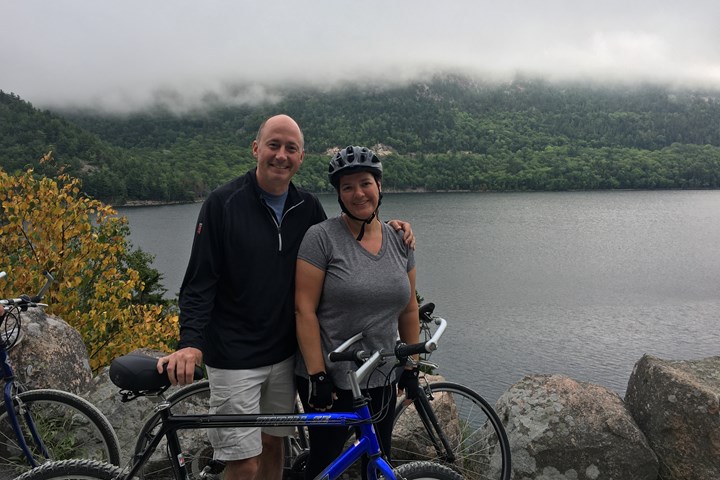
Richard Lynch, vice president at MacDermid Enthone, and his wife Kerry.
Richard Lynch has over 30 years in the finishing industry, but he still feels like a kid on Christmas morning when he thinks about his future in finishing. He’s worked his way up to vice president of MacDermid Enthone, working with industry greats like Frederick Gumm along the way. His passion for technology and sustainability keeps moving him forward.
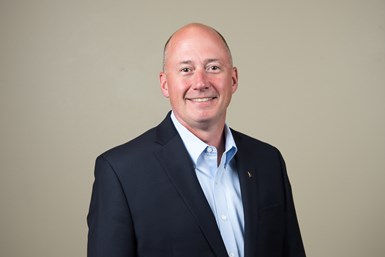
Richard Lynch of MacDermid Enthone
PF: How did you first get involved in the finishing industry?
RL: A great guy, Nick Duva, gave me a job at Frederick Gumm Chemical during my freshman year at Bryant University in 1987. I worked full time while going to school and I am forever grateful that they allowed me to be involved in a variety of roles during that time. From manufacturing to the lab, and ultimately sales, they fueled my interest in our industry.
Featured Content
PF: Did you grow up wanting to be involved in manufacturing, or were there other aspirations?
In high school, I was very focused on engineering and architecture but ultimately was swept up in the Reagan era business focus. I actually wore sweater vests like Alex P. Keaton in the TV show Family Ties.
PF: What was your first job (finishing or otherwise) and what did you learn from it?
I worked as a product specialist in a joint venture between Gumm Chemical and a Japanese company after graduating, which completely changed my life and perspective. I spent considerable time with the CEO, Fred Gumm, who was an excellent businessman and visionary to the fundamental supply chain shift and opportunity which was to occur in the North American market. The opportunity to spend considerable time in Japan and work directly for a Japanese manager was a cultural awakening for me. Thirty years ago, it was unusual to spend a semester abroad. This was mine and it lasted two years.
PF: How has the industry changed since you started your career?
It is a very different landscape driven by the consolidation in our industry and market forces which have moved sectors to different geographies. NAFTA was signed in 1994 and the globalization of the supply chain of course lead to complete paradigm shifts. However, it is really the story of how all business has changed, not just our industry, to a global society and business environment fueled by the technology revolution. In 1987, there was no email; today I have already had a video conference call with Asia and Europe. Tremendous change but I have never been more excited or optimistic for our industry than I am today.
PF: What leadership advice would you give to younger people just starting out?
The single most impactful thing you can do is to identify a mentor who is highly regarded in your organization and learn all you can. Do not be afraid to ask “why” and have engaging conversations, or to have more than one mentor serving different facets of the business. People are willing to share and invest their time if they feel it is well spent but you need to engage them, knowledge and understanding will not just rain down on you.
Communication is another essential item. Everyone knows this but few do it well and this will make you stand out more than any other singular skill. Recognize that everyone absorbs information differently and they also have different needs and perspectives which require you to tailor your message and alter your style to be impactful.
Lastly, keep an open mind and actively seek out other perspectives from your own. Your decisions will be more considered and thoughtful outside of the vacuum of your own perspective. It has never been more important than in our global society today and is a consistent trait in great leaders. None of us know it all, so we should do all we can to make informed decisions.
PF: What’s the best piece of advice you were given, personally or professionally, and who gave it to you?
So many have been impactful but I will never forget my first major promotion where I was to be a young person managing dozens of more experienced people. Fred Gumm, the CEO, pulled me aside on my last day in the office before relocating and told me to remember that, while change may be easy for me, it is extremely difficult for most people. It seems so simple, but I still remember it as a perspective-changing moment. Life is always changing and professionally our responsibilities are to drive change within our organizations to meet the needs of an ever-changing marketplace. Recognizing this simple truth does not alter our need to drive change but it does change our strategy for how to communicate and effect change. It also helps us address needs within our companies or personal lives which we may not naturally consider.
PF: What would you say makes MacDermid Enthone special?
Most leaders feel their company is special and I have been in the industry more than thirty years with many great teams. There is no question, however, that our people are exceptional and the greatest team with which I have ever worked. The sheer magnitude of experienced leaders in technology, supply chains, applications and our industry is staggering. More so in their willingness to share their expertise and help each other, our customers and our company. Our resources and depth of understanding are second to none but the willingness to do everything they can for our customers is absolutely inspiring to me every day.
PF: What do think are important things for coaters and finishers to do in order to stay competitive in the industry?
When you step back from the everyday, to me there is a clear delineation between companies as we have all navigated globalization, the technology revolution and market changes. Much, of course, depends on the goals of the individual company but there is no question that it is very difficult to “go it alone.” In my opinion, continuous capital investment has become a substantial requirement for success due to ever-increasing quality requirements and efficiency gains to remain competitive. This, of course, can only be paid for with top-line growth and few companies can afford the scale required to actively sell and position themselves within their target supply chains while making these investments.
From our perspective, technology is important but it’s only a piece of the equation where a supplier partner can add substantial value. Optimizing a process for efficiency is easy to say, but not everyone has the specific skill set to measure this effectively and connect it to dollars. Working with a partner to gain access and influence into targeted supply chains is extremely important to articulate value and differentiation to those markets.
Lastly, we believe sustainability will determine success and survival as we go forward. Companies that can deliver on the customer requirements but do so with an ever-shrinking environmental footprint will be the winners in the years to come. We have invested heavily to meet this customer need through our technology portfolio of chemistry, offering trivalent chrome and chrome-free etching of plastic, metal recovery technologies and wastewater treatment chemistry and equipment.
PF: What motivates you and how do you inspire your team?
I have been around more than 30 years, but I feel like a kid on Christmas morning. Our ability to help our customers grow while transitioning to a sustainable future gives me goosebumps every day. I work hard to communicate to our team on a global level the role we have to play and the bright future for us all as we work together. There is no better place to be or space with more opportunity to grow as a company and as individuals — we can all have a role and positive impact on the future.
PF: Who have you learned the most from?
Shuji Igarashi taught me a structured approach to problem solving which has served me well in every facet of my career. Joe Cahill, who has an unsurpassed work ethic and a perspective I respect; his work ethic is the only one who could hold a candle to my mother’s, who worked two jobs and was a model of perseverance during my youth, which I reflect on often. I would also mention Bernie Smith, my stepfather and a successful businessman, who has taught me to respect other opinions and to be measured and thoughtful.
PF: What organization or company, aside from your own, do you most admire?
St. Judes Children’s Hospital is an amazing organization I have respected and admired for decades. Only when they touch you personally can you appreciate the true magnitude of their greatness.
PF: What do you see as some of the biggest challenges in the coming year?
There is no question that the economic crisis brought about by the novel coronavirus is a challenge we all share. Wherever we are in the world and whatever industry we serve, our businesses and lives will be changed forever. We have focused every single day on all the elements that we believe will drive success for our customers and ultimately our company through this new lens, which we believe simply accelerates our strategy.
As stated earlier, change is always a big challenge and we are faced with change on a massive scale for all elements of our industry. We will look back five years from now and be amazed at the pace of evolution in each of our businesses.
PF: What do you see as the biggest management myth?
I guess it would have to be the whole “it’s who you know” thing. There is no question that relationships and access to decision makers is extremely important and helpful internally and externally. The relationships are important because they build a foundation of mutual respect and trust to enable deep and meaningful business discussions. Gone are the days where people buy solely or promote internally because you are their friend. None of us can afford that approach, because there is little room for mistakes. We appreciate and value all our customer relationships, but do not take them for granted. Everything we do is focused on understanding the needs of a business, how we can help them achieve their goals and providing measurable value.
PF: Describe a business decision you made that had a lasting impact (good or bad).
With an eye to some of our younger readers, I would say one good business decision I’ve made is accepting new roles that required relocation. I moved to New Jersey at 21 to be close to headquarters, to Michigan when I was 24 to take a sales territory and later to the Carolinas to be VP of manufacturing. These are not dramatic global relocations, but they were big decisions and changed my life as I made new friends —which I am still close today — but also because they were new roles and each very different. I have been fortunate to work for a company that has always provided opportunities to grow professionally. Accepting these challenges gave me a well-rounded knowledge of our industry that would not be possible otherwise.
PF: What advice would you give to yourself 10 years ago?
Buy Amazon.
RELATED CONTENT
-
Cleaning, Pretreatment to Meet Medical Specs ISO 13485 or FDA 21 CFR820
Maximilian Kessler from SurTec explains new practices for industrial parts cleaning, metal pretreatment and decorative electroplating in the medical device industry.
-
Stripping of Plated Finishes
The processes, chemicals and equipment, plus control and troubleshooting.
-
A Chromium Plating Overview
An overview of decorative and hard chromium electroplating processes.















